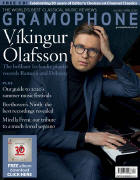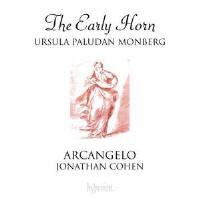Texte paru dans: / Appeared in: |
|
|
Outil de traduction (Très approximatif) |
|
|
Reviewer:
David Threasher Ursula Paludan Monberg, born in 1982 in Aalborg, Denmark, is already the doyenne of the natural horn, having occupied principal chairs with The English Concert, the Orchestra of the Age of Enlightenment, Arcangelo and others. A veteran of B minor Masses (including the Gramophone Award-nominated one by this ensemble – 11/14), she now makes her solo debut recording with a selection of pieces from the mid- and late 18th century. Monberg is demonstrably a master of the instrument. Even with the later invention of valves, the horn remains notoriously difficult to play, so with just a mouthpiece and bell connected by several feet of brass tubing, to make anything approaching an expressive sound is an achievement. Fair enough that the recorder takes the lead in a concerto by Telemann; but the blend with oboe d’amore in an anonymous concerto in E and another in D by one of the Graun family shows why combinations of horn with the larger oboes became such a favourite of Bach, Haydn and others. Chromaticism is achieved by hand, squeezing and pinching notes from the bell. Tone quality is obviously never going to be even and it is fascinating to hear how this was seen by these composers not as a limitation but as a challenge. If the tuning becomes a little gamey higher up, that’s a quirk of the instrument, not the player The star is predictably Mozart’s Horn Quintet, which closes the disc. The extra twist here is that the edition used is by JA André, who was the prime mover behind so many first printed editions of Mozart’s music after the composer’s death. Apparently the work was best known in an arrangement for string quintet, and this is the first printing to restore the horn part, albeit with a few minor cuts and some of the difficult lower notes transposed up an octave. It’s well worth waiting for at the end of the disc, the athleticism of its closing Rondo echoing the Sinfonia da camera by Mozart’s father with which the programme opens. If the quintet towers above the rest of the music here, it’s nevertheless fascinating to hear what was expected of the horn players of the time. |
|




